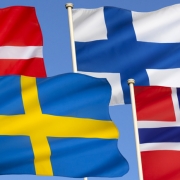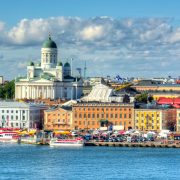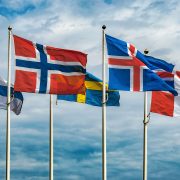Why Ayn Rand Laughs — The Las Vegas Democratic Socialism Debate
Since the politicians are still falsely claiming that the successful Nordic economies are socialist, we are -reposting this Mark Shupe article from 2018.
“In one century, Sweden had the fastest economic and social development that its people had ever experienced, and one of the fastest the world had ever seen.” This quote from Johan Norberg is about the years 1850 – 1950. What has happened in Sweden since the democratic socialists infiltrated government in the 1950s is another story. And Nina Sanandaji adds muscle to the factual narrative by writing for the Institute for Economic Affairs:
The phenomenal national income growth in the Nordic nations occurred before the rise of large welfare states. The rise in living standards was made possible when cultures based on social cohesion, high levels of trust and strong work ethics were combined with free markets and low taxes.
Regarding Denmark, economist Otto Brons-Petersen wrote in 2015:
Danish per capita GDP relative to other countries reached a maximum 40-60 years ago. At the time Denmark became rich relative to the rest of the World, it was not a welfare state. In fact, Denmark has historically been a low tax country by international standards. Until the 1960s, the Danish tax revenue to GDP ratio was at the same level as the US, and lower than the British.
So it would make sense, that in the 1960s, that the Nordic countries of Europe were well on their way to sustainable prosperity and a model for the developing world.
The Dawning of the Age of Absurdity
And then in the 1960s everything changed. The western world was experiencing social and political transition in the wake of complete victory over national socialism after World War II. The massive government infrastructures that remained were repurposed for the new welfare state, and the vanquished enemy was rebranded as fascism in order to create ideological distance. Perhaps the most eloquent description of the dominant philosophy of the 1960s is this lyric from the Fifth Dimension’s inspirational hit song of 1968:
Peace will guide the planets. And love will steer the stars. This is the dawning of the age of Aquarius. Age of Aquarius! Harmony and understanding. Sympathy and trust abounding. No more falsehoods or derisions. Golden living dreams of visions. Mystic crystal revelation. And the mind’s true liberation.
The astrological mysticism aside, the 1960s was defining itself in the western world as the Age of Love, and this was illustrated brilliantly in Ayn Rand’s prophetic 1957 novel, Atlas Shrugged. Essentially, it was the transfer of compassion and benevolence from the individual and privately funded charities to the progressive administrative state. Virtue was nationalized, personal responsibility was sacrificed.
The economic might created during the previous century in Scandinavia and America, by free individuals unencumbered by onerous taxes and regulations, was to be liberated for the common good. And make no mistake, your mind was to be liberated as well. Or else.
The Lost Decades
By 1950, the Nordic countries were finally enjoying a world free of Nazi threats and resuming their lives of peace and prosperity. However, according to Stefan Karlsson, Sweden experienced a 30 year expansion in government spending that was unprecedented during a period of peace. “Virtually every year, taxes were increased while the welfare state expanded relentlessly.” In 1970, Prime Minister Olaf Palme stepped up the socialist transformation, rapidly increasing regulations and payroll taxes. And along with increasing union wage demands, Swedish business became highly uncompetitive on the global markets. To combat this, Palme introduced currency devaluation, and inflation rose sharply.
And in Denmark, income tax rates grew rapidly in the second half of the 1960s. “A left wing coalition government and then a right wing one increased the tax to GDP ratio by some ten percentage points. Petersen writes “The welfare state attracted new clients and new programs were added, the economic crisis led to increasing unemployment. By the early 1980s the economy was in very bad shape, with high unemployment, an inflationary spiral, a huge and widening government deficit.”
But the Age of Absurdity was not confined to Scandinavia. In the United States, President Johnson initiated his Great Society programs in 1964. Phil Gramm and John Early report in a recent Wall Street Journal article, that during the 20 years before the War on Poverty, the portion of the nation living in poverty had dropped to 14.7% from 32.1%. According to Edward Glaeser in the City Journal, 95 percent of “prime-age” men between the ages of 25 and 54 in 1967 worked. Today however, more than 15 percent of such men aren’t working. “The rise of joblessness—especially among men—is the great American domestic crisis of the twenty-first century.”
A Return to Reason
The Scandinavian experience has a lot to teach us, especially before the Age of Absurdity. As Norberg paraphrases a 1763 essay by Anders Chydenius:
The problem is the oppressive and corrupt system that makes it impossible for people to stay in Sweden and build a good life there. Privileges, license requirements, and trade prohibitions protected a small lazy aristocracy and stopped hard-working people from making their own luck. High taxes confiscated whatever they managed to create; a corrupt justice system made it impossible for them to win against the powerful.
Starting in the 1990s, Nordic governments have been rolling back the stifling regulation and reducing the economic burden of the welfare state, but it continues to permeate their societies. As a 38 year old Norwegian named Liam recently posted to an online forum:
“To do business of any kind you need to register with the state and pay a license fee. And there are a lot of regulations. Still they claim that we have a free non-socialistic economy. Well, it is practically regulated into a monopoly for a chosen few. The government of Norway are today on the right officially, but still they play into the hands of the EU. It is still a monster in between. You can see more on how this works at The Capitalist Party of Norway. We do work hard to get into the Norwegian parliament to stir it up a bit. I see a lot of similarities in the Norwegian economy to what happened in Atlas Shrugged.”
Anders Ingemarson of separatestateandtheeconomy.com sums it up well:
Sweden has much to teach us, but it is the opposite of what the progressive “democratic socialists” would like us to think. Swedes can primarily teach us what financial and spiritual mistakes to avoid. It is their costly missteps during the second half of the 20th century we should learn from.







